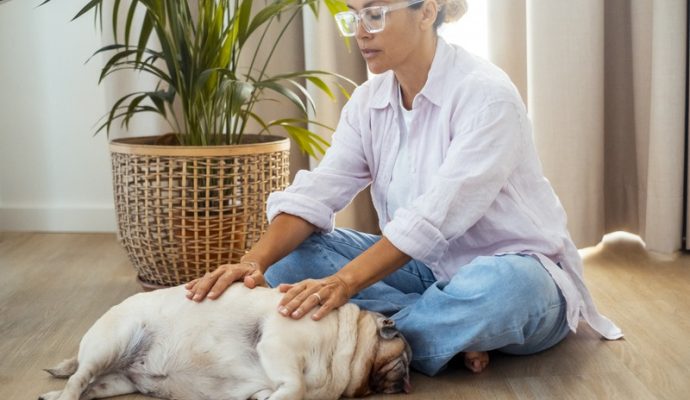When it comes to our furry companions, we all strive to provide them with the best care possible. Our pets bring joy to our everyday lives, so keeping an eye on their health and well-being is crucial. Sometimes, this might mean looking beyond the basics and understanding the signs that suggest a need for specialized veterinary care, such as internal veterinary medicine.
Indicators Your Pet Needs Internal Medicine Vet
Caring for your beloved pet involves more than daily walks and treats. In some cases, their health needs require the skilled attention of veterinary internal medicine. Here are the scenarios to watch for:
1. Subtle Changes with Your Dog
Observing subtle behavioral changes in your pets, such as loss of interest in toys or increased sleep, could indicate health issues requiring attention from a veterinary internal medicine specialist. Early detection and consultation with a vet experienced in internal diseases are crucial for your pet’s health, as they are trained to diagnose and manage complex conditions affecting your animal’s internal organs.
-
Decreased appetite or changes in eating habits
-
Unexplained weight loss or weight gain
-
Altered bowel movements or urination patterns
-
Inexplicable lethargy or changes in activity levels
2. Showing Signs of Discomfort or Pain
Pets are often adept at hiding pain or discomfort, but there are visible cues that can alert us to their distress. A persistent cough, difficulty breathing, or reluctance to move can all signal internal issues that warrant professional attention. Other indicators to watch for include:
-
Whimpering or crying out when touched or moved
-
Swelling or bloating of the abdomen
-
Sudden onset of aggression or changes in temperament
-
Hunched posture as if guarding the belly area
3. Exhibiting Gastrointestinal Woes
Disruption in your pet’s digestive system can lead to various ailments. Gastrointestinal signs often point towards conditions that require an internal vet’s expertise. Recurrent issues like vomiting or diarrhea, which might seem familiar, sometimes indicate a more significant internal problem.
-
Consistent vomiting or gagging
-
Diarrhea that persists over 24 hours
-
Blood in stool or vomit
-
Straining to defecate or reduced fecal output
4. Manifesting Symptoms of Organ Dysfunction
The organs form the internal powerhouse of your pet’s body. Your pet’s well-being is at serious risk when they underperform or malfunction. It’s imperative to recognize early on symptoms that might indicate kidney, liver, or heart disease, among other internal conditions. These symptoms include:
-
Increased thirst and urination, pointing to possible kidney issues
-
Jaundiced eyes or gums suggest liver dysfunction
-
Fainting or difficulty breathing, which may be related to heart problems
-
Changes in eye clarity or visible third eyelid, indicating potential diseases
When your pet shows signs that go beyond the scope of routine veterinary care, that’s where the specialized field of veterinary internal medicine comes in. These practitioners are equipped with advanced training to diagnose and treat illnesses that affect the internal body systems of our pets. They delve deep into complex cases, from hormonal disorders to infectious diseases.
Preparing for the Unforeseen
An emergency with your pet can be one of the most stressful experiences for any pet owner. But when should you rush to a facility that handles a vet emergency Sacramento-area pet owners can access? Here are some urgent circumstances that demand immediate veterinary intervention:
-
Severe bleeding or bleeding that doesn’t stop within five minutes
-
Choking, difficulty breathing, or constant coughing
-
Inability to urinate or pass feces or pain associated with these actions
-
Evidence of poisoning, such as ingestion of toxic substances
Proactive Steps for Pet Health
To maintain the health and happiness of your pets, it’s essential to be proactive. Every measure you take contributes to your pet’s overall well-being, from consistent veterinary care to a balanced diet. Below, we outline vital preventative steps that every pet owner should consider.
Regular Veterinary Check-Ups
-
Consistency in Care: Schedule regular check-ups with your vet to monitor your pet’s health.
-
Early Detection: Routine visits help detect potential health issues that can be more easily treated when caught early.
Proper Diet
-
Balanced Nutrition: Feed your pets a balanced diet appropriate for their age, size, and breed.
-
Weight Management: Ensure their diet helps maintain a healthy weight to prevent obesity-related conditions.
Exercise
-
Physical Activity: Incorporate regular exercise into your pet’s routine to keep them physically fit.
-
Mental Stimulation: Engage in play and activities stimulating your pet’s mind to support overall mental health.
Vaccinations
-
Immune Defense: Maintain your pet’s health by ensuring timely dog vaccinations, safeguarding against common and severe diseases, and promoting a long, healthy life for your canine friend.
-
Long-Term Health: Vaccinations contribute to a longer, healthier life by preventing illness before it starts.
Each step plays a crucial role in safeguarding your pet’s health. Staying ahead with these preventative measures minimizes the risk of illness and contributes to a joyful and fulfilling life for your beloved pet.
Partnering with Your Vet
Ultimately, the relationship you foster with your vet is the first line of defense for your pet’s health. Open communication facilitates early detection of potential issues, making regular visits and discussions about your pet’s health and behavior paramount.
-
Keep a record of any abnormalities in behavior or physical signs
-
Schedule annual wellness checks to monitor health trends
-
Consult with your vet about specific breeds and age-related concerns
Final Thoughts
As a devoted pet owner, recognizing the signs that your pet needs an internal vet is part of your responsibility. By understanding the signals, you enable a timely response that could be lifesaving. Paying close attention to changes, maintaining proactive health measures like vaccinations, and preparing for emergencies ensures you’re providing the best chance for a healthy, happy life for your furry family member. Stay vigilant, and remember that you’re not alone on this journey — your vet is your ally in ensuring your pet’s well-being.




